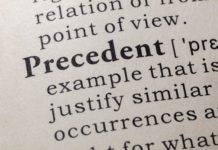“do not live separately and apart on a permanent basis”
High Court. Can a couple live "separately and apart" even when they reside in the same home? Is it possible for a couple who maintain "separate residences" to not be living separately and apart, so long as they live as a "single household"?
Direction 79: consideration of matter repetitiously
Federal Court (Full Court). In assessing Direction 79, can it be said that, "where a matter is relevant to two or more mandatory relevant considerations, a decision-maker is not usually required to take the matter into account repetitiously"?
s 501CA(4): can decision-maker defer assessment of non-refoulement claims?
High Court. "Where the representations do include, or the circumstances do suggest, a claim of non‑refoulement under domestic law", is it open to the decision-maker to "defer assessment of whether the former visa holder is owed those non‑refoulement obligations on the basis that it is open to the former visa holder to apply for a protection visa"?
s 501CA(3) and r 2.52 interpreted
Federal Court. Does the Tribunal have jurisdiction to review a delegate's decision made under s 501CA(4) of the Migration Act 1958 (Cth), even if the delegate’s decision was invalid or beyond power?
Clause 820.211(2)(d)(ii): meaning of “compelling reasons”
Federal Court. The expression “compelling reasons” in cl 802.211(2)(d)(ii) of Schedule 2 to the Regulations was not defined. Did that expression have the same meaning discussed in Plaintiff M64/2015 in the context of cl 202.222(2)? Is the genuineness of the marriage a matter that must be taken into account in determining whether there are compelling reasons for not applying the Sch 3 criteria? If not, does that mean that the Tribunal was bound to ignore the nature of the relationship?
Is the materiality of an incorrect invitation under s 501CA(3)(b) relevant?
Federal Court (Full Court). If a non-citizen makes representations under s 501CA(4)(a) within the period specified by the legislation and the Minister (or Tribunal) makes a decision under s 501CA(4)(b) on the merits of the case on the assumption that the representation is validly made, but the period fixed in the invitation issued under s 501CA(3)(b) is incorrect, is that decision nevertheless valid? In other words, will an error in the date fixed in the invitation justify the grant of remedies by a court only if the error is material?
Must risk of re-offending be based on probative evidence?
Federal Court (Full Court). Could a conclusion that a non-citizen posed a risk of reoffending similar to other ordinary Australian residents rationally support a conclusion that the risk was unacceptable? Can it be said that "a finding that the appellant’s conduct has not been tested in the community does not establish that the appellant is a risk of reoffending"?
Section 29(1) of the AAT Act interpreted
Federal Court. Would a Tribunal application to review a decision made under s 501CA(4) of the Migration Act 1958 (Cth) be invalid and of no effect if it failed to "contain a statement of the reasons for the application", as required by s 29(1)(c) of the AAT Act, even if such a statement were subsequently provided to the Tribunal, but after the deadline for a merits review application?
Direction 90: cl 9.2 interpreted
Federal Court. Can it be said that, "in order to raise a relevant issue under cl 9.2 there needs to be some evidence of the relevant support in the home country"? For the purpose of cl 9.2, is it "necessary that there be some evidence or material to demonstrate there is some qualitative difference between the circumstances in Australia and those in the applicant’s home country"?
BVE: obligation to explain why certain conditions would be imposed for the purpose of...
Federal Court. Was the Tribunal obliged to explain why certain conditions (if any) should be imposed for the purpose of cl 050.223 of Schedule 2 of the Migration Regulations 1994 (Cth), instead of merely listing such conditions in its reasons for decision? If so, was that obligation obviated if the visa applicant conceded to the Tribunal that those conditions should be imposed?



















